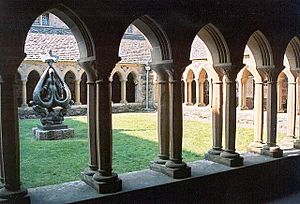 Image via Wikipedia
Image via WikipediaThe group was formed in 1997 with the following aims:
- To encourage member Churches to explore, discover, affirm and share their spiritual traditions and current practices.
- To promote an understanding of spirituality which embraces the whole of life, and leads to action for justice and service in the world.
- To encourage co-operation between the Churches and all those Bodies in Association, groups, communities and networks concerned in prayer and spirituality.
- To support and encourage the work already being down at Intermediate and local levels through Spirituality Forums, Quiet Days, retreats, etc; to arrange occasional consultations and promote networking among those concerned about spirituality in England; to co-operate in any four nation events organised by CTBI's (Churches Together in Britain and Ireland ) Living Spirituality Network.
- To hold to the wide variety of forms of spirituality - charismatic, sacramental, evangelical, etc - and promote unity in diversity; but to be aware that some forms of spirituality can be damaging, and to warn when necessary.
- To be sensitive to the spirituality of each human being, and to promote the use of accessible language in helping people explore their relationship with God and how it works in the world.
- publications like Such a Feast and Sharing Our Spiritual Treasures
- consultations on subjects like 'Faith and Spirituality'. 'Youth Spirituality', 'Hospitality at Holy Communion' and 'Healthy and Unhealthy Spiritualities'
"'Spirituality' was part of the churches' heritage when the group began. It was their 'property'. In the intervening years it has become a consumer product, partially secularised, and frequently individualised. It would appear that the churches have therefore lost some of their interest and enthusiasm for this area of church life. It is as if Spirituality covers every dimension of church life, and yet has no 'particular place' and in many cases has a very low profile and certainly does not register as a priority on the Churches' agenda. The paradox is that outside the church structures spirituality has never been more alive, or sought after, and this in itself poses a challenge to the church of today."
The group has identified some themes it might pursue and seeks further ideas and responses to them:
- the value of a spiritual discipline
- the need for a Rule of Life
- the diversity of experience of the Spirit which can lead to member bodies taking opposing stances on ethical issues
- the relationship between theology and spirituality

No comments:
Post a Comment